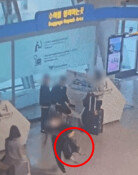Gov`t announces plans to promote trade and investment
Gov`t announces plans to promote trade and investment
Posted September. 26, 2013 05:45,
The government has decided to make aggressive support on the construction of a seven-star traditional Korean house that Korean Air is promoting near Gyeongbok Palace in central Seoul. It will also devise support measures for the creation of a children`s park in Jung Island in Chuncheon and a leisure tourism park in Samyang farm in Pyeongchang.
At new cities and areas lifted from development restriction (green belt), the government will designate nine new high-tech complexes and promote a massive remodeling on old industrial complexes. In addition, various environment regulations will be lifted to ease corporate burden and seek agricultural products for exports.
The government held its third trade and investment promotion meeting Wednesday presided by President Park Geun-hye, and discussed third stage measures to invigorate investment.
○ Building tourist hotels, leisure complex and theme park
The biggest measure is a plan to support five private-investment projects that had been faltering due to regulations. The government expects a 5.7 trillion won (5.3 U.S. billion dollars) new investment effect.
The government will improve the procedure of approving tourist hotels that have no harmful facilities to be built near schools. Currently, tourist hotel construction is banned on places 200 meters within areas where there are primary and secondary schools and located without approval from regional education offices. The government will give chances to businesses to make related briefings while in screening process, and allow them to undergo re-screening after changing plans if they fail the first screening. The government will also make efforts to pass the tourist hotel deregulation law that is pending in parliament by devising complementary plans.
The government did not mention cases of individual companies, but industry sources say Korean Air will benefit from the new plans. Korean Air bought a land in 2008 near Gyeongbok Palace to build a premium traditional Korean hotel, but has yet to execute the project as Seoul Metropolitan Government has opposed it saying schools are nearby.
Support will also be made in earnest on the Lego Land on Jung Island in Chuncheon, Gangwon Province. Jointly with London-based Merlin Entertainments Group, the province is promoting a project to build a theme park on the island. The government will promote free land lease by designating it as a foreign investment promotion zone, and also make financial support for building a bridge linking Chuncheon and the island.
In addition, the farmland in Pyeongchang, Gangwon Province being operated by Samyang Food will be designated as a special zone to support development of a leisure complex for livestock and tourism. Laws will be revised to enable chip makers build additional factories at reserve forest lands.
○ Designation of nine additional high-tech complexes in cities
The government will also make a massive overhaul of nationwide industrial complexes to enhance their competitive edge. The number of industrial complexes in cities, currently at 11, will be increased to 20 by 2015. These zones will accommodate talented manpower and high-tech companies including IT and service industries. For potential sites, the government is examining four areas lifted from green belt zone, two in the Seoul metropolitan area and two in regional areas, as well as a housing site in new cities and one area for relocating an existing plant. The new industrial sites will offer benefits of high floor area and low green ratio.
Entry barrier will be eased for existing industrial complexes. The government will select 12 service sectors including electricity and telecommunications, and transport equipment leasing to allow entry of industrial facilities. Within industrial complex, complex land site system will be introduced to allow construction of plants, exhibition centers and sales facilities. Facilities were restricted by land site types until now leading to the inconvenience of separation of plants and convenient facilities.
Environment regulations will also be revamped. Companies had to get emissions permission for air, water, noise pollutions separately, but all environment-related permission system will be integrated going forward. The regulation bills such as chemicals management laws that were in disputes in the corporate sector will be massively eased in the enforcement ordinance stage.
Plans to increase agricultural product exports were also discussed to find and foster promising products for export. The government will set up an exclusive team to increase the number of products exporting more than 100 million dollars from the current 13 items to 23 in 2017.







